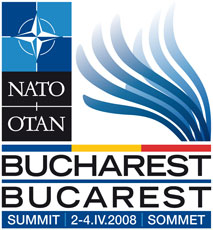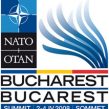
NATO MAKES POLITICAL COMMITMENT TO UKRAINIAN, GEORGIAN MEMBERSHIP
Publication: Eurasia Daily Monitor Volume: 5 Issue: 65
By:

At its Bucharest summit, NATO postponed a decision on approving Membership Action Plans (MAPs) for Ukraine and Georgia; but it gave the two countries much more than immediate MAPs. The Alliance committed itself clearly–albeit without a deadline–to the political and strategic goal of Ukrainian and Georgian membership in the Alliance.
“NATO welcomes Ukraine’s and Georgia’s aspirations for membership in NATO. We agreed today that these countries will become members of NATO. Both nations have made valuable contributions to Alliance operations. We welcome the democratic reforms in Ukraine and Georgia and look forward to free and fair parliamentary elections in Georgia in May. MAP is the next step for Ukraine and Georgia on their direct way to membership. Today we make clear that we support these countries’ applications for MAP. Therefore we will now begin at a high political level to address the questions still outstanding, pertaining to their MAP applications. We have asked Foreign Ministers to make a first assessment of progress at their December 2008 meeting. Foreign Ministers have the authority to decide on the MAP applications of Ukraine and Georgia” (NATO Bucharest Summit Declaration, press release April 4).
In an accompanying statement, NATO Secretary-General Jaap de Hoop Scheffer announced, “These countries will become members of NATO, there can be no misunderstanding of that,” and “not a sliver of a doubt,” he added for emphasis (press release, April 4).
As Zbigniew Brzezinski commented (PAP, April 4), the summit’s outcome turns a looming tactical defeat into a major strategic success for Ukraine, Georgia, and their North American and European supporters. The tactical defeat had seemed distinctly possible, ahead of and midway through the summit, as a result of German-led attempts to block the MAPs, giving Moscow an indirect veto through Berlin on the decision. However, pro-MAP countries mustered sufficient critical mass to turn the table on the nay-sayers and win the debate. They shifted it from the technical issue of the MAPs to the political issue of membership for Ukraine and Georgia in NATO.
As a net result, membership prospects for Georgia and Ukraine in NATO are no longer in doubt. Membership itself remains subject to their performance as assessed by the Alliance, as with all aspirant countries. NATO is a beneficiary of this decision, no less than Ukraine and Georgia. The decision has restored the credibility of NATO’s open-door, merit-based admission policies, which had been thrown into question by those who were resisting the MAPs in deference to Russia.
For the first time in the NATO’s 59 year history, the Alliance announces a political commitment to inviting countries–Ukraine and Georgia in this case–to become members in due course. Moreover, this commitment is being announced even before the two aspirant countries have technically embarked on the MAP process. Until now, all MAP countries went on to become members of the alliance; but the process was not automatic. Moreover, in the pre-summit debates, the advocates of Ukrainian and Georgian MAPs attempted to overcome German objections by decoupling MAP from actual membership in their arguments. While there is no “guarantee” of post-MAP membership and there never was, the summit’s decision commits the alliance to that outcome, contingent on performance.
This decision is bound to impress at least three key constituencies. First, it will stimulate Ukrainian and Georgian officialdom (the former needing more stimuli than the latter) to perform strongly on the MAPs, given the actual membership prospect. Second, it should enhance the Ukrainian and Georgian leaderships’ standings with their own public in upcoming elections. And, third, it makes clear to Russia that NATO has a strategic stake in Ukraine and Georgia, even if they are not yet members of the alliance and irrespective of the duration of the MAP process.
As the summit’s communiqué clearly implies, Ukraine and Georgia need not wait until the next summit for a decision to approve their MAPs. The communiqué empowers the North Atlantic Council at the level of ministers of foreign affairs to make such a decision at one of its meetings between this summit and the next. In consideration of German and like-minded views, the December 2008 ministerial meeting shall undertake a “first assessment” of Ukrainian and Georgian performance. This may enable the German-led group to ask for a second and possibly even a third assessment prior to the 2009 summit. The first results to be assessed at foreign ministers’ meeting in December. Already, German and French diplomats are cited as saying that MAP approval in December is hardly conceivable to them, as they would call for further assessments (Frankfurter Allgemeine Zeitung, April 4).
However, opportunities for stonewalling should be exhausted by the 2009 summit, if the Ukrainian leadership focuses on the NATO agenda more closely than it has since 2005 and if Georgia continues its strong performance as a de facto ally.




